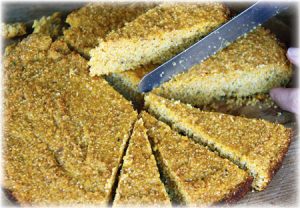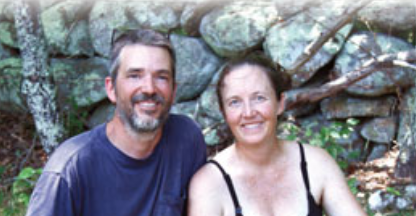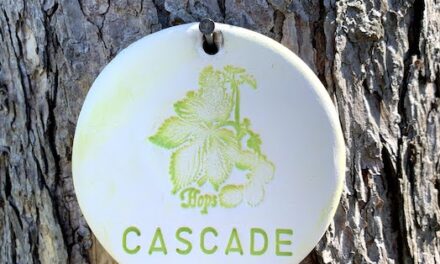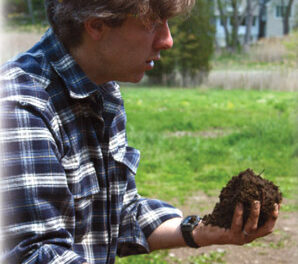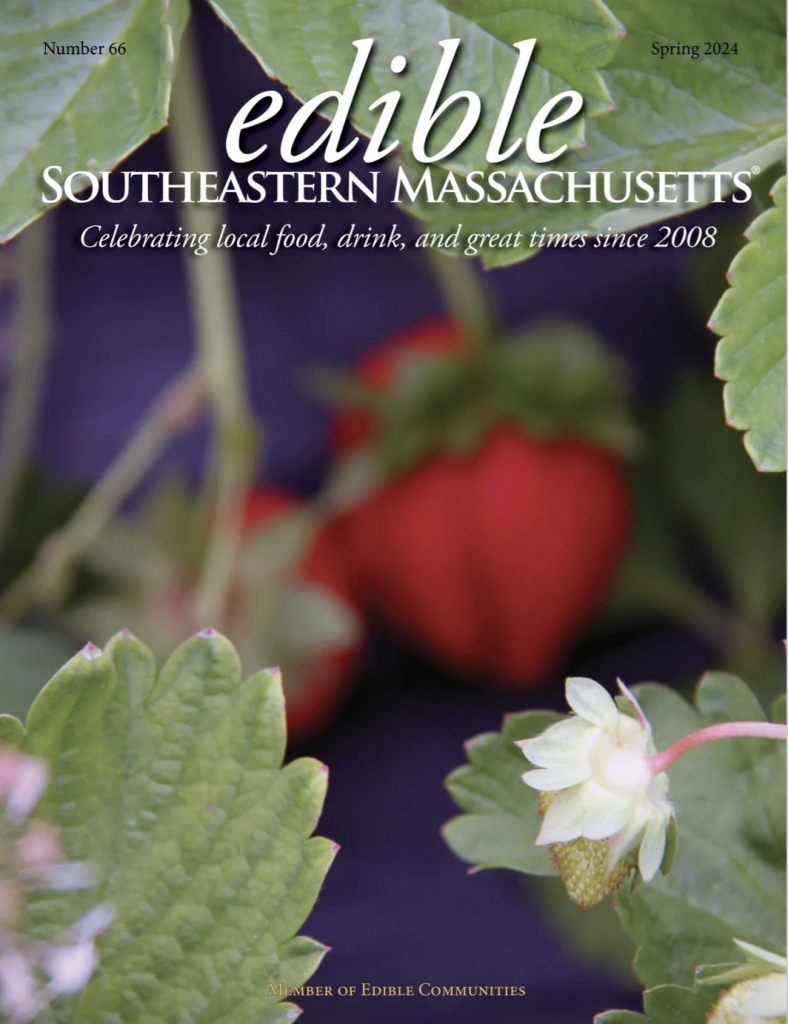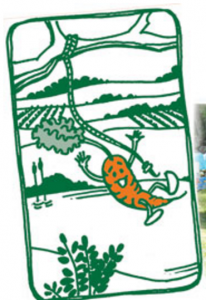
Ben and Hannah Wolbach have their feet firmly planted in the soil. While their hands are busy, they have time to reflect on the work they do and the kind of farmers they want to be. Ben is a thinker, a philosopher, an innovator. He sees the big picture: the farm within the community within the region. He likes to think outside of the pod, rooting out unconventional solutions to conventional farming problems and pushing for better ways to do things. Alternatively, Hannah is efficient, organized, practical, and engaged in the job at hand. She knows the devil is in the details. Together, they are like peas and carrots.
The couple met in a school garden. Hannah, the incumbent grower, was leaving to travel across country, stretch her legs, and do some hiking. Ben, her newly appointed replacement, was starting work a month before Hannah’s official departure for garden handover. The stars aligned, and the summer sun smiled down on the couple. “It was a good month, we fell in love,” Hannah says, catching Ben’s eye across the table. He smiles. It took just three weeks to realize there was something ambrosial growing between them, and it wasn’t just the row of beets.
“It was important that we met in a garden,” Ben adds. “The hours were long, and we got to know each other.” Hannah’s background as an environmentalist-cum-gardener complemented Ben’s philosophy that “farming is an important avenue to put energy behind for anybody who cares about the environment.” They shared a lot in common, and their passion for sustainability and regenerative land management ignited something unquenchable between them. With Hannah’s looming departure, they realized they had a problem on their hands. “How do you want to handle this?” they asked each other. In the end, they went their separate ways but stayed in touch across the miles. Right away, they looked for another landing place, somewhere they could one day continue to farm together. That place was Holly Hill Farm in Cohasset.
Before Skinny Dip…Holly Hill Farm
Holly Hill is where they got their feet wet, spending five years learning to farm together. The farm has a lot of wetlands, irrigation is a constant challenge, and the landscape has a generous sprinkling of large rocks. Ben and Hannah experienced their fair share of ups and downs, but together the duo made a strong team and learned how to build a community around a farm. With the experience they were gaining, Hannah and Ben were able to think critically about the farm they would like to have one day, and save money for it.
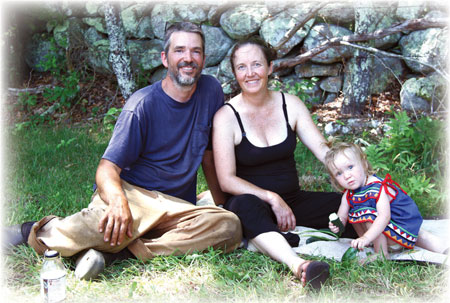
Ben and Hannah Wolbach and their daughter, Matilda take a break.
In 2011 they branched out on their own, leasing five acres in Westport. They also bought a split-level Cape on two open, fertile acres in Little Compton, Rhode Island. Hannah recalls their search for land, driving around Westport, and falling in love with the area. “We would be driving along and shouting out everything we saw. Cows! Grapes!” she laughs. The couple was enthralled with all the possibilities the region offered. They started out, quite literally, from the ground up. “Step one,” Ben says of the early days, “was to buy a bucket!” He chuckles. “Step two: find a tractor.” As they stepped out on their own, they were able to implement the ideas they had been brewing. For the couple, it was not enough to just become certified organic. They were all in and wanted to address all farm aspects, even energy use: from implementing solar power to reducing the use of petrochemicals and converting their vehicles and tractors to run on vegetable oil (which is still a work in progress).
Farming is more than just taking what you need from the earth; it encompasses political economics, chemistry, agronomics, environmental sciences, and history. With each project the Wolbachs undertake, and at every point of food production, they consider the implications of their actions and actively seek out mindful solutions. When it comes to farming, Ben and Hannah can be considered freethinking revolutionists. They have washed their root crops with a bicycle-powered washer; hauled their grains for grinding to the Grist Mill in Plymouth, which harnesses hydropower to drive the mill; and used an open-source farming and ecology platform to share, innovate, and collaborate with farmers from all around the world—which is where they learned about Coolbots! You simply cannot run a farm without a walk-in cooler to keep your harvest fresh for market, but most of them draw a lot of energy. Ben and Hannah found the shell of an old cooler and used Coolbot technology to convert a window air-conditioning unit into a refrigeration unit. “It has a much better energy analysis than most traditional coolers,” Ben says. “Plus, we give renewed purpose to something that might otherwise have been discarded.”
Field Rotation
Land management is a vital part of sustainable farming. Of the seven acres of Ben and Hannah’s farm, one to two acres are pulled out of production every year and cover-cropped with grasses and legumes that put nitrogen and organic matter back into the soil. This gives them a three- to four-year rotation plan for their fields. They also raise meat birds as part of their soil fertility plan (chicken manure is one of the most nutrient-dense fertilizers, and raising chickens on cover-cropped pasture is good for the soil and good for the chickens).
Having a strong sense of purpose when you choose a life of farming is an important compass. As Hannah says, “people sometimes romanticize farm life. It’s a lot of hard work, but I still do it because I love the work, and it fits with my ethics.” We sit at their long farm dining table enjoying some fresh, sweet, crunchy carrot sticks, while Matilda—Ben and Hannah’s daughter—gurgles happily nearby in a highchair. She has been enjoying her lunch, a bright orange sweet potato her mom and dad planted, nurtured, and then pulled from the earth. Her favorite meal is made from heritage flint corn, grown on the farm, ground at the Grist Mill, and cooked into polenta with homemade chicken broth from chickens raised on the farm. At just over a year old, Matilda is a bright, observant, and very content little girl. Though she may not know it, she is a powerful driving force for her mom and dad, who want to raise her in an environment where all life thrives.
This couple has brought Skinny Dip Farm from five acres and a bucket to a viable farm that services a CSA, three farmers’ markets (Mattapoisett, Plymouth, and Westport), and some thriving wholesale markets. Still, they manage to keep things light, as reflected in the farm name. “The name Skinny Dip Farm captures the quintessential part of summer, swimming in secluded lakes, and being outdoors.” Ben smiles, adding, “it also generates some interesting conversations at the markets.”
Impressive
Anybody who has ever run a business can appreciate all that Hannah and Ben have accomplished. It is easy to be inspired to follow their example. When asked what kernels of wisdom they would share with would-be farmers, Hannah instantly replies, “Work for an established farm first, to learn how to do it and do it well, and make sure you enjoy the work. Also, hire great people who you enjoy spending time with.” Ben adds, “Farming is so thoroughly challenging, I feel like I’m firing on all 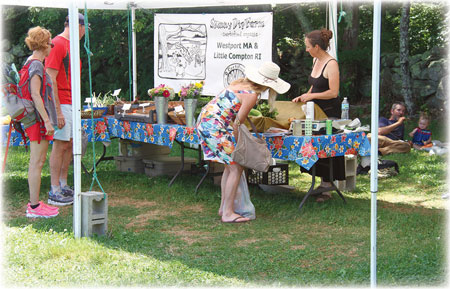 cylinders all the time. Every aspect of running a business successfully is also important in farming; marketing is just as important as growing. Not having a home for something you’ve grown can be discouraging! And use the resources out there available to new farmers, like The Carrot Project, Southeastern Massachusetts Agricultural Partnership (SEMAP), and Natural Resources Conservation Science, which can help with financing, land procurement, and infrastructure investments.” Ben is on the Board of Directors at SEMAP and currently fills the role of treasurer, another extension of his big-picture vision of a sustainable farm and food network in the region.
cylinders all the time. Every aspect of running a business successfully is also important in farming; marketing is just as important as growing. Not having a home for something you’ve grown can be discouraging! And use the resources out there available to new farmers, like The Carrot Project, Southeastern Massachusetts Agricultural Partnership (SEMAP), and Natural Resources Conservation Science, which can help with financing, land procurement, and infrastructure investments.” Ben is on the Board of Directors at SEMAP and currently fills the role of treasurer, another extension of his big-picture vision of a sustainable farm and food network in the region.
Hard work aside, “When you get your mind going, and your body is working hard—it’s deeply fulfilling,” Ben smiles. Hannah feels the same. Looking back over the years, she reflects on the challenges. “They are not what you remember. You only remember the good things: working together outside, doing work we love as a family, being around abundance, eating well, and growing good food for people.”
Walking around the farm, you can only respect and appreciate how committed this young couple is to bucking convention in favor of a more sustainable, regenerative journey, balancing the risk of new innovations with tried-and-true traditions. Ben says, “We live in a really different world. We are engaged in our community; a lot of our friends are farmers. We are watching people flourish, and it is hard not to have hope.”
Skinny Dip Farm
1603 Main Road
Westport, MA 02790
and
85 Willow Avenue
Little Compton, RI 02837
(401) 592-0237
www.SkinnyDipFarm.blogsot.com
Pamela Denholm works with many local farmers through her own business, South Shore Organics. She is inspired by Ben and Hannah to push the boundaries of convention, and deliver “better than organic” solutions to the South Shore.
Recipe Inspired by this Article: SKINNY DIP SWEET POTATO CORNBREAD
